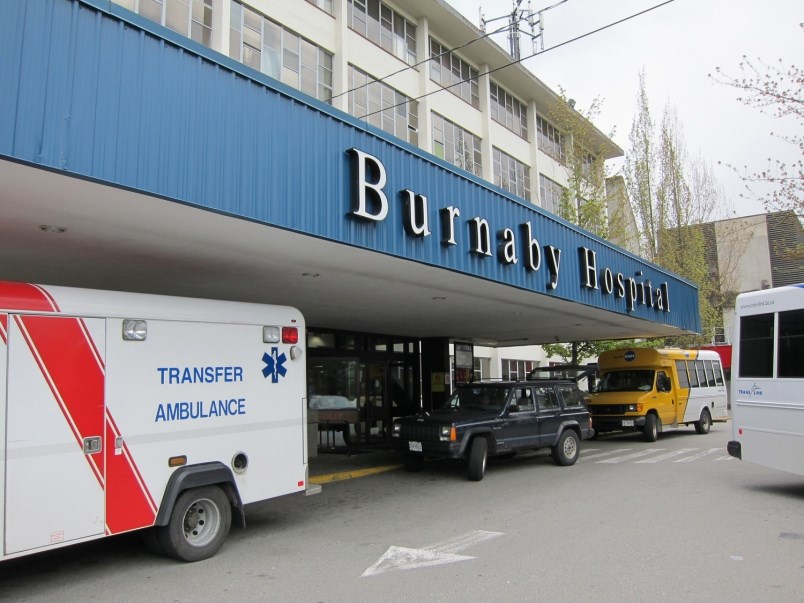A man wielding a knife chased a group of nurses down a hallway at Burnaby General Hospital last week, part of a disturbing trend in health-care violence that has the Opposition public safety critic calling for metal detectors and dedicated police officers at hospitals.
The man was in a shared room in a unit where elderly patients awaiting assisted living stay, when he tried to punch a nurse, pulled out a knife and chased three nurses down the hall while waving the knife at them, according to the nurses’ union.
The nurses were terrified, both from the incident and also the fact there was no nursing station or safe room for them to hide in during the attack.
The man was eventually tackled by relational security officers, and is believed to have suffered a head injury. Meanwhile, all three nurses reported time lost due to a violent incident to the Workers Compensation Board, and one suffered a psychological injury impacting their physical health, according to the union.
It’s the latest in a long line of rising violence at hospitals and health-care centres, with the union saying incidents like this are now occurring almost weekly. A nurse was choked unconscious by a patient in a psychiatric ward at Vancouver General Hospital in March, and a patient at a Port Moody hospital chased staff with a machete in January.
In Burnaby, the knife was believed to have been in the man’s belongings, which were not checked when he was admitted to the ER.
Another patient at the same hospital last week reportedly threatened staff members with a gun.
Those are examples of why there needs to be some type of security scanners at hospitals, said Opposition public safety critic Elenore Sturko.
She questioned why MLAs at the legislature are protected with metal detectors and armed police officers that search visitors, but doctors, nurses and other critical health-care staff are not.
“I’m not saying everyone who comes into a hospital has to surrender all their items and cell phones,” she said.
“But surely given the present situation in healthcare, and the types of violent attacks we’ve seen and the prevalence of weapons, things like machetes and firearms and crossbows and all this stuff, we really need to increase our game to protect nurses.”
Sturko has also been calling on government to create a dedicated police force for high-risk hospitals, saying that the current relational security guard model — trained to de-escalate but not confront in violent situations and instead call police — is inadequate for the weapons, violence, drugs and other problems seen in hospitals.
In the case of the Burnaby patient with a knife, the security guards were heroic to tackle the man but put themselves at grave risk, Sturko said.
“I’m grateful relational security guards were there to help but, being they are unarmed, had the situation changed they too were at risk of being stabbed or killed,” she said. “And that’s not according to how they are licensed. And that is not the intent, having them there to be [confronting patients] armed with weapons. It concerns me we’d be putting people in those situations.”
The nurses’ union has backed the call for dedicated hospital police.
But Health Care Minister Josie Osborne and Premier David Eby have said they are satisfied with the current model.
The man with the knife at Burnaby hospital had been twice certified under the Mental Health Act, according to the nurses’ union.
That comes at a time when the B.C. government is facing calls to overhaul the Mental Health Act to allow for more involuntary detention of people who may pose a risk to themselves or others, in the wake of the tragedy involving a suspect with mental health concerns killing 11 people at the Lapu Lapu festival in Vancouver last month.
WorkSafeBC stats show that violence-related time loss claims for nurses have risen to 46 a month in B.C., from only 25 a month a decade ago.
Solicitor General Garry Begg was on the defensive over provincewide violence and crime at the legislature Thursday. Opposition critics cited communities like Williams Lake where constituents are suffering violent random attacks and businesses are seeing more break-ins.
“The crimes that we are seeing across the province are very concerning,” said Begg. “Make no mistake about it.”
But he also said crime is lessening, arguing it has declined six per cent in Vancouver from 2018 and 14 per cent in Kamloops.
“We’re making progress all across the province,” said Begg.
Maybe on a spreadsheet.
But in the real world, in B.C.’s hospitals, nurses say they are seeing the opposite.
Rob Shaw has spent more than 17 years covering B.C. politics, now reporting for CHEK News and writing for Lodestar Media. He is the co-author of the national bestselling book A Matter of Confidence, host of the weekly podcast Political Capital, and a regular guest on CBC Radio.
[email protected]
🚨New newsletter alert! Stay ahead of the curve in B.C. politics. Get expert political analysis delivered straight to your inbox, plus inside scoops and other stories from across the province. Sign up here for the Capital & Coast newsletter.




